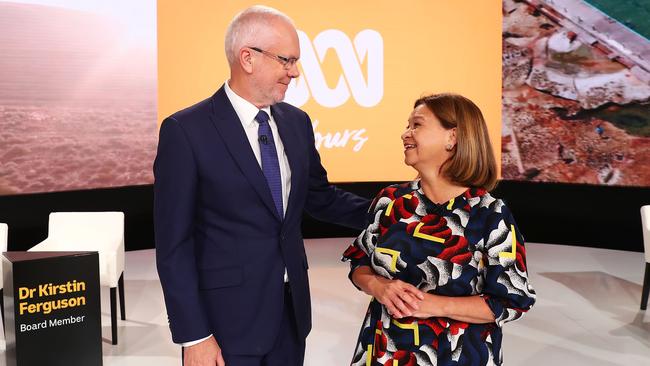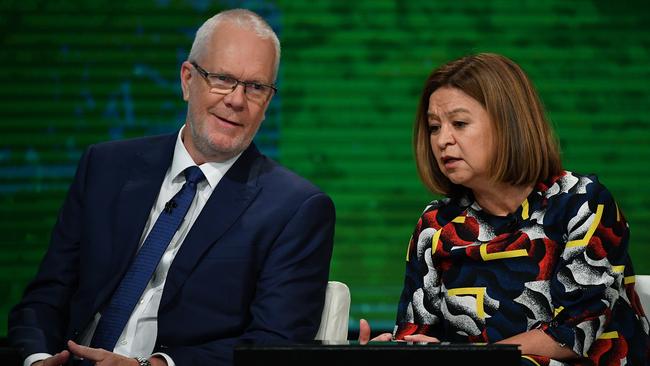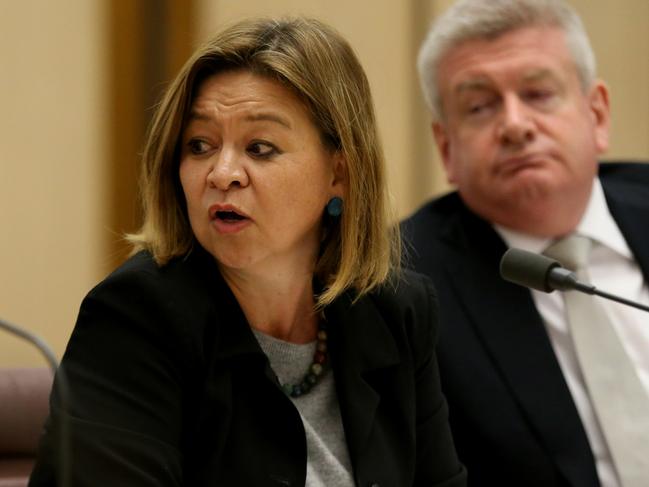The undoing of Michelle Guthrie
In the early days, there was much to like about Michelle Guthrie. But at the halfway mark of a five-year term, her job had become untenable. What went so wrong?

In the dying days of last month, as a good proportion of the ABC’s 850 journalists had their attention fixed on the toppling of the prime minister in Canberra, a leadership change of a different kind was unfolding right under their noses.
Michelle Guthrie, the reformist managing director, the first woman to be appointed to that position in the 86-year history of the ABC, was in serious trouble.
The ABC board, headed by former Telstra executive Justin Milne and which had the power to summarily dismiss her, was unhappy with her performance and attempts to make amends were not going well.
In recent times it seemed that everyone was against Guthrie. Staff and unions had been offside for months because of restructures and redundancies in which more than 1000 staff left.
Then prime minister Malcolm Turnbull rang around ranting about ABC News stories, with political editor Andrew Probyn’s report about plans by Donald Trump to bomb Iran, sourced to Australian government figures, a particular source of outrage.
Communications Minister Mitch Fifield had long ago gone cold. When he fronted up to Senate estimates hearings to be grilled alongside Guthrie, the minister would barely bother to say hello.
Even the Left-leaning Guardian Australia had attacked Guthrie over perceived absenteeism and frequent trips abroad to her second home in Singapore, where her husband ran a restaurant, as well as the “Larry” thankyou card initiative.
Then in a story in The Australian Financial Review, Guthrie revealed she had really wanted to come back to Australia to seek board positions, but then the ABC job had come up, making the whole thing look like a plan B. It sounded if not tone-deaf, at least tin-eared.
Things seemed to go up a gear last month. Even previous supporters had soured. A group of female executives had met a newly arrived Guthrie for a high-powered bonding session in 2016, to re-acquaint her with the Australian media scene. But recently one added her voice to a common complaint about Guthrie. “I wanted Michelle to work so desperately, but she doesn’t listen,” the female media executive said last week. “You’d think that you were cutting through but nothing would happen.”
In the end, it seemed that those to whom Guthrie was unwilling to listen included ABC board members. Performance evaluations, letters and phone calls attempting to improve the situation proved ineffective.
“Michelle is quite firm in her views,” a senior source said yesterday. Such an assessment would surprise no one at the ABC.
The decision to terminate Guthrie’s employment was made in a two-hour national phone hook-up of board members on Sunday night.
In the early days, there was much to like about Guthrie. Lacking airs and graces, she dispensed with the MD’s car spot, took herself (and sometimes her daughter) to ABC outposts, flying without minders. Everyone seemed to approve when she sacked more than 200 middle managers, with the stated aim of returning that money to content makers. She wanted the ABC to reach 100 per cent of Australians and readjust its budget to deliver 80 per cent of funds to content makers and leave just 20 per cent to administration, thanks to a much flatter management structure. Budgets for investigative reporting and for the regions increased.
An unstated aim was to visit every ABC office in the land.

It is hard to pinpoint where things went wrong, but by this month they clearly had.
Earlier this month, after the Liberal leadership coup, Guthrie sat at the head table at The Australian Women’s Weekly’s lunch in the glorious surrounds of Sydney’s Quay restaurant to hear former foreign minister Julie Bishop speak. ABC stars Virginia Trioli, Sarah Ferguson and Fran Kelly were present but seemed to engage as little as possible with their boss. It would not have happened with predecessor Mark Scott, the former Fairfax executive who knew his way around a newsroom, and around Canberra.
Some style Guthrie’s tenure as one of unprecedented government attacks on the ABC, but those critics have short memories. Government dissatisfaction with the ABC, to varying degrees, should be considered the norm rather than the exception. Remember that prime minister Tony Abbott banned ministers from appearing on Q&A after the panel program invited former terror suspect Zaky Mallah on as a guest. Bob Hawke was outraged in the 1980s by the ABC’s incredibly effective 8c-a-day funding campaign, and was furious in the 90s about the experts that The 7.30 Report employed to comment on the Gulf War.
Certainly obstacles were ranged against Guthrie. The ABC had few friends in the government. The range of inquiries included an efficiency review and a competitive neutrality review, investigating whether projects such as ABC Life gave the organisation an unfair advantage using its government funds to pressure commercial rivals. Plus, the government will attempt to force the ABC to reveal staff salaries.
There had been a precipitous plunge in staff satisfaction, down 6 per cent in a single year. Staff and executives were losing confidence. It was noted Guthrie was absent from one estimates meeting because she wanted to attend her daughter’s graduation.
In next year’s federal budget the government will set the ABC’s triennial funding, including an indexation freeze that robs it of $83.7 million across three years.
ABC staff felt Guthrie didn’t understand them or was a poor public champion of their cause. Melbourne’s Mornings radio presenter Jon Faine memorably took on his boss this year, suggesting she was invisible and not championing the ABC enough.
Guthrie took the view that she had greater impact by speaking out selectively, debatable in this media-saturated era.
Milne later publicly declared he was a Faine fan — a comment that now takes on a different hue.
The board appoints the managing director. The government appoints the board and its chairman.
But the board has undergone a few crucial changes since Guthrie’s appointment, not the least of which was the replacement of the chairman who appointed her, former judge Jim Spigelman, by Milne.
In recent months, a serious budget issue flared. Announced projects such as extra episodes of Four Corners and the second phase of funding for Guthrie’s contestable Great Ideas Grant, which included the criticised ABC Life website, had to be pared back.
Some sort of budget issue had angered the board. One source said the ABC had overspent on redundancies. Management dissatisfaction was added to the chorus of complaint.
Two former executives spoke of a “toxic” executive environment and a supplanting of content executives, at Guthrie’s behest, by chief financial officer and head of strategy Louise Higgins, and Helen Clifton, the chief digital and information officer brought across from TVNZ.
“Michelle clearly favoured and would do what Louise and Helen wanted. There was definitely a feeling of the content blokes and everyone else,” a former executive says. “They used to run the company and they don’t any more.”
But latterly there had been more turmoil and word that Higgins was out of favour — a situation other executives had found themselves in.

The Australian understands the managing director and chairman clashed over Project Jetstream — a plan to build a giant digital database to house all ABC content. The “giant iview” would expand to house digital collections of government museums and galleries and archives. “There are risks,” Milne said in a previous interview. “There were risks also with the introduction of television. But the bigger risk is doing nothing.”
Milne is thought by some to have overstepped his boundaries as chairman, collaborating with Higgins on Project Jetstream and cutting Guthrie out of the loop.
The sacking comes as the ABC goes cap in hand to the government for its next three-year funding deal — worth more than $3.3 billion — which will be announced in next year’s budget.
Additionally, Milne wants the government to approve spending on Project Jetstream, which could amount to hundreds of millions of dollars. Neither can be achieved if the ABC is out of favour with the Coalition government.
By the end of last week, ABC executives appeared even more agitated than usual.
Into that atmosphere stepped The Australian. On Sunday, the paper sent a series of questions about the breakdown of relations between Guthrie and Milne to her office and to the ABC board. Management and the board took all day to respond with a “no comment”. By the end of the day, the board met and dismissed Guthrie.
The Australian’s media commentator Mark Day gave Guthrie’s reign a 2.5-star rating yesterday before her sacking. It may be the only time a News Corp commentator has given the managing director of the national broadcaster a higher mark than the ABC’s own board.
There were “considerable and concerted” efforts to resolve issues, one source said.
Yesterday Milne told the ABC News Channel: “The board felt in the end her leadership style was not the style that we needed going forward. We needed a different leadership style and that is the decision of the board.”
Milne wasted little time in moving the ABC forward on Jetstream. Most ABC staff — exhausted by continual staff briefings, management jargon and new initiatives — will have little strategic concept of the project. “We just need to embrace Jetstream wholeheartedly and move forward with that,” Milne told the ABC News Channel. “And that’s a big infrastructure build and it’s a difficult thing to decide to do because we will be building infrastructure that won’t be used for sort of three years.
“This is a difficult moment for the ABC and none of this is a reflection on Michelle, but the difficulty that we have here is that we now need to plan the next 10 years, and that’s what we’re attempting to do and Jetstream will be a significant part of that in the next 10 years.”
In the end it seemed Guthrie had few supporters. Her personal statement was released by Andrew Butcher, a former News Corp colleague who once headed up communications for Rupert Murdoch in New York.
Guthrie, clearly stung by the extraordinary turn of events, penned a statement unusual in its frankness. There was “no justification” for the board to terminate her, she said, adding she was considering her legal options.
“I am devastated by the board’s decision to terminate my employment despite no claim of wrongdoing on my part,” Guthrie said.

She spoke of breaking down internal barriers to progress, investing in investigative journalism, regions, innovation and efficiency.
“As the first female managing director of the ABC, I felt a tremendous responsibility and unique privilege to lead Australia’s most important cultural institution. At all times I have promoted the ABC’s importance to the community, including having to defend and protect the ABC’s independence.”
She spoke of continuing the transformation and of the primacy of content, saying “at no point have any issues been raised with me about the transformation”.
She wished the staff well and hoped they would “continue their mission to keep all Australians informed and entertained”.
They will do so, just without her.
She joins Geoffrey Whitehead and Jonathan Shier as short-lived MDs. Whitehead resigned under pressure, replaced in 1986 by David Hill, who was ABC chairman, while Shier was terminated in 2001 after a disastrous reign and replaced by ABC executive Russell Balding.
Milne chose David Anderson, the former head of television, who missed out to Guthrie for the top job, to be interim managing director. He may well get the role permanently.
One executive said he felt sorry for his former boss, but he had already left the corporation. A current staff member sent a text saying “The Queen is dead”, accompanied by a handclap emoji.
Guthrie is contemplating legal action, and as one executive predicts, “it could get messy”.
During the past couple of months, amid requests for her to change her style, she had been heard to state “I am who I am”. As the ABC moves towards the future, the next managing director will be something Guthrie could never be: one chosen and approved by Milne.
